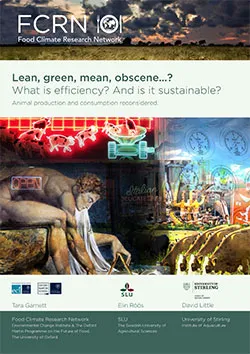We all know that the food system today is undermining the environment upon which future food production depends. But while we generally agree that we need do something to make food systems more sustainable, we do not necessarily agree about what, exactly, should be done. This paper explores these questions by considering how stakeholders think about efficiency in relation to animal production and consumption, both terrestrial and aquatic. It takes as its starting point three broadly discernible views.

One word that comes up time and again in discussions about the way forward is ‘efficiency.’ It is argued that we need to develop systems that are more environmentally efficient. But what is efficiency? What are we being efficient with and efficient for? And is efficiency actually sustainable?
 From one perspective, all animal production is inherently inefficient. We eat animals that eat plants; arguably we could eat plants directly. Others reject this view as overly simplistic: from their second perspective, a ruminant feeding on unfertilised, unirrigated, natural grass and producing meat or milk or traction power is perfectly efficient – it creates something from nothing, providing the ultimate free lunch. But a third standpoint points to the pasture-reared cow’s high emissions intensity; for them the intensively reared chicken is the paragon of efficiency, since far less feed and land is required to produce meat than the grass-fed cow.
From one perspective, all animal production is inherently inefficient. We eat animals that eat plants; arguably we could eat plants directly. Others reject this view as overly simplistic: from their second perspective, a ruminant feeding on unfertilised, unirrigated, natural grass and producing meat or milk or traction power is perfectly efficient – it creates something from nothing, providing the ultimate free lunch. But a third standpoint points to the pasture-reared cow’s high emissions intensity; for them the intensively reared chicken is the paragon of efficiency, since far less feed and land is required to produce meat than the grass-fed cow.
This paper shows that these three takes on efficiency are founded on different ways of thinking about the inputs to, and the output and impacts arising from the food system. All are also influenced, however subtly, by the values people bring to their assumptions about counterfactual uses for land or resources, their attitudes to humanity’s place in the natural environment, and about the malleability of the economic status quo.
Ultimately this paper tries to understand and distil some of the key criticisms and countercriticisms people have about the concept, before suggesting a way forward that might add focus to future discussions.
The paper is written by Tara Garnett (FCRN and University of Oxford), Elin Röös (Swedish Agricultural University – SLU) and David Little (University of Stirling).
Citation: Garnett T, Röös E and Little D (2015). Lean, green, mean, obscene…? What is efficiency? And is it sustainable? Food Climate Research Network, University of Oxford.




Comments (0)